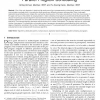Free Online Productivity Tools
i2Speak
i2Symbol
i2OCR
iTex2Img
iWeb2Print
iWeb2Shot
i2Type
iPdf2Split
iPdf2Merge
i2Bopomofo
i2Arabic
i2Style
i2Image
i2PDF
iLatex2Rtf
Sci2ools
106
click to vote
TPDS
1998
1998
On Exploiting Task Duplication in Parallel Program Scheduling
—One of the main obstacles in obtaining high performance from message-passing multicomputer systems is the inevitable communication overhead which is incurred when tasks executing on different processors exchange data. Given a task graph, duplication-based scheduling can mitigate this overhead by allocating some of the tasks redundantly on more than one processor. In this paper, we focus on the problem of using duplication in static scheduling of task graphs on parallel and distributed systems. We discuss five previously proposed algorithms and examine their merits and demerits. We describe some of the essential principles for exploiting duplication in a more useful manner and, based on these principles, propose an algorithm which outperforms the previous algorithms. The proposed algorithm generates optimal solutions for a number of task graphs. The algorithm assumes an unbounded number of processors. For scheduling on a bounded number of processors, we propose a second algorithm whi...
Algorithms | Processors | Task Graphs | TPDS 1998 |
Related Content
| Added | 23 Dec 2010 |
| Updated | 23 Dec 2010 |
| Type | Journal |
| Year | 1998 |
| Where | TPDS |
| Authors | Ishfaq Ahmad, Yu-Kwong Kwok |
Comments (0)

